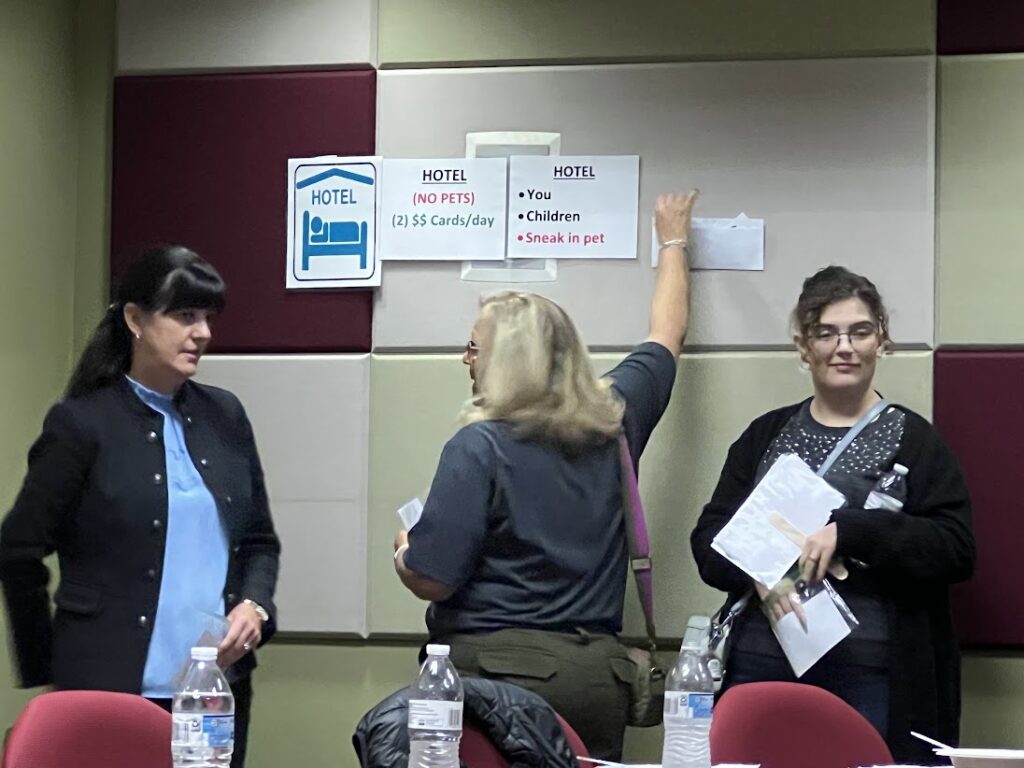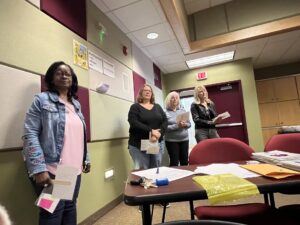
BY DEBBIE PAGE
Participants in a Domestic Violence Task Force simulation were surprised at how difficult they found it to leave an abusive situation during an event at Mitchell Community College’s Mooresville campus.
Each person was given one of five identities in various situations and then were presented with a series of scenarios and had to decide among five options: stay in the abusive situation, rent a hotel room that does not accept pets, rent an apartment in a high crime area, go to a female-only shelter that does not accept pets, stay with a relative or friend, or become homeless.
Each of the five roles had funds or “care cards” to spend, but many also had obstacles, including children and pet safety, disabilities, advanced age, health conditions, undocumented status, or the difficult choice of leaving a home the victim owns.
Statesville Police Department Community Resource Coordinator Pam Navey and Mooresville Police Department Community Resource Coordinator Lori Carlson conducted the simulation, which Navey said would help participants uderstand “the reality of leaving a domestic violence situation if you have not been through it.”
All participants started at the “home” station and then decided whether to stay or leave as Navey presented various scenarios, during which they were not allowed to talk or share resources, which illustrated the isolation domestic violence victims often experience.
The first scenario presented in which a partner had punched a wall after the victim wanted to have coffee with a friend. Few participants chose to leave.
The next scenario involved anger over an item purchased, resulting in a shove and smashed phone when the victim called 911. The kids witnessed the incident and are crying and screaming. Because there are no marks on the victim, police advised the spouse to take a walk and cool off, making no arrests. A few participants chose to go another station once the kids are involved.
In another scenario, the victim suffers a beating and has visible bruises, is locked out, and the victim’s clothes were bleached and ruined. A neighbor sees the injuries. More participaants left “home” once the violence escalated, but some still chose to stay because of the limited resources their character possessed.
Those who left home had to decide whether to spend limited resources on clothes and toiletries after quickly leaving home. Others needed counseling for themselves or kids and had to decide whether to expend resources or hang on the best they could.
Occasionally, Carlson would ring a bell to either indicate a pay day or a bill to pay in the midst of these scenarios, further complicating the situations.
Characters were also stalked or harassed by the abuser at work, losing shifts or sometimes even jobs. Some were too disabled or too ill to work. Those with relatives wore out their welcome and had to find another place to stay, which caused some victims to return to the abusive home because they had no other options.
Some characters began using drugs or alcohol to escape their pain and mental stress.
Several participants chose to say in the abusive home until their pet was nearly killed or the abuser was drunk, armed, and saying they would kill the victim because they lacked resources.
Two who had the elderly, disabled woman identity stayed in the abusive home throughout the situation. One remained because “her character was an elderly woman and this was her home, all she had.” The other said being disabled and without resources left her “stuck because she had to keep her home. She had no kids, so I took the abuse.”
The undocumented character returned home because her abuser, who had purposely not filed the visa paperwork after the marriage in an effort to control her, threatened to reveal her status and have her fired from her job and deported.
Tom, a male victim of emotional and mental abuse, had 24 hours to return home or be humiliated by the abusive spouse by calling his employees with embarrassing information and posting humiliating things about him on social media.
At the end of the 40-minute simulation, 18 of the participants were back in the abusive home, with one homeless, and two in a hotel.
AFTER THE SIMULATION
In the debrief afterwards, participants said they felt very frustrated throughout the process. They were hampered by lack of resources and stymied by the choice to leave a person they once or still loved to go into an unknown situation.
Some were reluctant to move their kids from their home or to leave pets behind if their limited resources would not allow them to go to a place that accepted them. Navey said pets are a major sticking point for women she had worked with over the years because “people will sacrifice a lot for their pets.”
Others who were being abused in a home they owned were reluctant to risk losing it or having the home damaged by the abuser before they could legally remove the person.
Disabilities, having a special needs child, and immigration status were also steep obstacles that caused most to return to the abusive situation.
When asked to describe feelings toward their abusers as they moved through the various scenarios, some participants said they wanted to retaliate, “to take him out without getting caught.”
Navey noted that some victims are in prison because they acted on these types of feelings.
Others described feelings of fear, while others hung onto hopes that the abuser would change. Others stayed because of fears the abuser would get full or partial custody of the children because they lacked financial resources or employment and wanted to be present to protect them.
Access to money and the lack of other resources (health insurance, safe refuge, family or friend support) were huge issues for participants.
Another participant pointed out that victims do not always realize they are victims because they are brainwashed to believe the abusive behavior is normal or the victims’ fault.
“From somebody on the outside of it, it’s always easy to say, ‘Just leave,’ ” added another.
Navey pointed out that abuse is not always physical. Abusers may just be controlling or regularly put down the victim. Others may abuse through emotional or verbal abuse or through unwanted sexual demands.
Navey ended the session with Paulette Kelly’s haunting poem, “I Got Flowers Today,” which she dedicated to domestic violence victims who lost their lives after escalating domestic violence:
“I Got Flowers Today”
I got flowers today!
It wasn’t my birthday or any other special day.
We had our first argument last night;
And he said a lot of cruel things that really hurt;
I know that he is sorry and didn’t mean to say the things he said;
Because he sent me flowers today.
I got flowers today.
It wasn’t our anniversary or any other special day.
Last night, he threw me into a wall and started to choke me.
It seemed like a nightmare.
I couldn’t believe that it was real.
I woke up this morning sore and bruised all over.
I know he must be sorry.
Because he sent me flowers today.
I got flowers today!
And it wasn’t Valentines Day or any other special day;
Last night he beat me and threatened to kill me;
Make-up and long sleeves didn’t hide the cuts and bruises this time;
I couldn’t go to work today because I didn’t want anyone to know—but I know he’s sorry;
Because he sent me flowers today.
I got flowers today!
And it wasn’t Mother’s Day or any other special day;
Last night he beat me again, and it was worse than all of the other times;
If I leave him, what will I do? How will I take care of the kids? What about money?
I’m afraid of him, but I’m too scared and dependent to leave him! But he must be sorry;
Because he sent me flowers today.
I got flowers today….
Today was a special day—it was the day of my funeral;
Last night he killed me;
If only I would have gathered the courage and strength to leave him;
I could have received help from the Women’s Shelter, but I didn’t ask for their help;
So I got flowers today—for the last time.
FOR HELP
♦ If you are in imminent danger, call 911.
♦ Call the 24 hour hotline at My Sisters House – 704-872-3403 (En Espanol – 704-880-1042).
♦ Download the Iredell County Domestic Violence Resource Guide for resources, protective order information, and learning how to stay safe while planning to leave a DV situation HERE.
♦ Call the national hotline at 800-799-SAFE.








